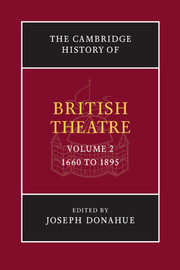Book contents
- Frontmatter
- Part I 1660 to 1800
- Part II 1800 to 1895
- 11 Introduction: the theatre from 1800 to 1895
- 12 Presence, personality and physicality: actors and their repertoires, 1776–1895
- 13 Theatres, their architecture and their audiences
- 14 Stage design from Loutherbourg to Poel
- 15 Theatre and mid-Victorian society, 1851–1870
- 16 Gendering Victorian theatre
- 17 Popular entertainment, 1776–1895
- 18 The Bells: a case study A ‘bare-ribbed skeleton’ in a chest
- 19 The new drama and the old theatre
- 20 1895 A critical year in perspective
- Bibliography
- Index
- References
16 - Gendering Victorian theatre
from Part II - 1800 to 1895
Published online by Cambridge University Press: 28 March 2008
- Frontmatter
- Part I 1660 to 1800
- Part II 1800 to 1895
- 11 Introduction: the theatre from 1800 to 1895
- 12 Presence, personality and physicality: actors and their repertoires, 1776–1895
- 13 Theatres, their architecture and their audiences
- 14 Stage design from Loutherbourg to Poel
- 15 Theatre and mid-Victorian society, 1851–1870
- 16 Gendering Victorian theatre
- 17 Popular entertainment, 1776–1895
- 18 The Bells: a case study A ‘bare-ribbed skeleton’ in a chest
- 19 The new drama and the old theatre
- 20 1895 A critical year in perspective
- Bibliography
- Index
- References
Summary
The theatre was uniquely alluring to women of the Victorian period. Itwas one of few professions accessible to women, holding out the prospect of a career that would be active, disciplined and — at least for a lucky few — remunerative. Life in the theatre also gave women a voice, for on stage they could speak while others sat waiting in suspense for their next word — including men, who in most other settings compelled women to silence. This control over audiences, over men in particular, often proved intoxicating to Victorian actresses. On the other side of the footlights, stunned Victorian men often became infatuated with women of the stage even as, paradoxically, they felt imperilled by them.
This fascination with the stage could be experienced powerfully and enviously by women who had no connection with the theatre at all. Florence Nightingale, for example, expresses it in Cassandra when she calls the opportunity of being a professional the supreme attraction of the life of an actress, much more than the opportunity to achieve fame or wealth. Amateurism was the fate of most women, however talented, singing or drawing ‘as an amusement (a pass-time as it is called)’, denying themselves a vocation to sacrifice their lives to the needs of a husband and children. But the actress was different:
in the morning she studies, in the evening she embodies those studies: she has the means of testing and correcting them by practice, and of resuming her studies in the morning, to improve the weak parts, remedy the failures, and in the evening try the corrections again.
- Type
- Chapter
- Information
- The Cambridge History of British Theatre , pp. 352 - 368Publisher: Cambridge University PressPrint publication year: 2004
References
- 2
- Cited by



